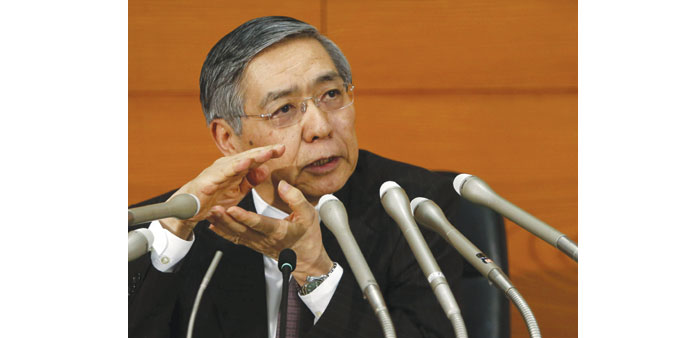Kuroda: Keeping the door open for further easing next year.
Bloomberg
Tokyo
Bank of Japan (BoJ) Governor Haruhiko Kuroda’s latest tweak to monetary policy is proving a boon for bond-market bulls.
Two-year yields dropped to a record of minus 0.055% on Friday while 20-year yields fell below 1% for the first time since January on Monday after the BoJ board lengthened on Friday the average maturities of Japanese government bonds it buys to as long as 12 years from the current limit of 10. Rates dropped even as the BoJ kept its main monetary stimulus target unchanged, a move Nomura Research Institute’s Tetsuya Inoue says keeps the door open for further easing next year.
The decline in sovereign note yields will help reduce long- term borrowing costs for Japanese companies as the central bank struggles to fuel inflation and growth in the world’s third- largest economy. Before the policy meeting, analysts were almost evenly split on whether the central bank would add to its asset- purchase program next year or stand pat.
“The move suggests there is still an option for further easing amid speculation of limits,” said Inoue, the chief researcher for financial technology and markets at Nomura Research Institute and a former BoJ official.
After the BoJ’s decision, 10-year JGB futures rose above ¥149 for the first time while the two-year yield plunged to minus 0.055%, blowing past the prior record of minus 0.04%. The 40-year JGB yield fell to the least since April and the 30-year yield dropped to levels last seen in March. Yields on shorter maturities have faced strong downward pressure on demand from overseas investors taking advantage of cheap funding costs.
The central bank said Friday it will need to boost JGB buying by about ¥10tn ($82bn) in 2016 compared with this year because of an increase in the redemption of the notes it holds. Around ¥40tn of its holdings will mature next year, according to an estimate by Bank of America Merrill Lynch.
“Because maturing JGBs held by the BoJ will rise from next year, the bank needs to increase bond buying even without expanding monetary stimulus,” said Makoto Suzuki, the senior bond strategist at Okasan Securities Group. “There’s pressure on the yield curve to flatten.”
The yield premium 30-year JGBs offer over five-year notes shrank to the least since May on Friday.
Kuroda, who acknowledged in a news conference on Friday that some of the adjustments would be hard for people to understand, said they were designed to make it easier for the BoJ to maintain its current policy and didn’t constitute additional easing.
“Additional easing is when the BoJ expands its monetary base target,” said Mari Iwashita, chief market economist at SMBC Friend Securities Co in Tokyo. “That action will likely be saved until prices start to slip or it becomes clear that reaching not only 2% but even 1% will be difficult.”
Around 48% of respondents in a December 9-16 Bloomberg poll said they don’t expect additional stimulus for the foreseeable future. Market players see increasing difficulty and technical limits for the BoJ to meet its target of expanding the monetary base by ¥80tn a year, as it is already buying a bulk of bonds issued to markets.
The central bank also said on Friday it will spend ¥300bn a year from April buying exchange-traded funds that track companies which are “proactively making investment in physical and human capital,” to offset the market impact as it resumes selling stocks purchased earlier from financial institutions.
The BoJ still expects to meet its 2% inflation target around the six months through March 2017, but that timing could change because of the slump in oil prices, Kuroda said. In October, the central bank delayed the deadline for the second time this year.
“The BoJ wanted to deliver a message particularly to overseas investors that the bank has not changed its easing stance,” said Yunosuke Ikeda, the head of Japan foreign-exchange research at Nomura Securities Co in Tokyo. “The timing was good because the BoJ’s delaying the period of achieving inflation target was spurring speculation that the bank was not serious about the target.”

